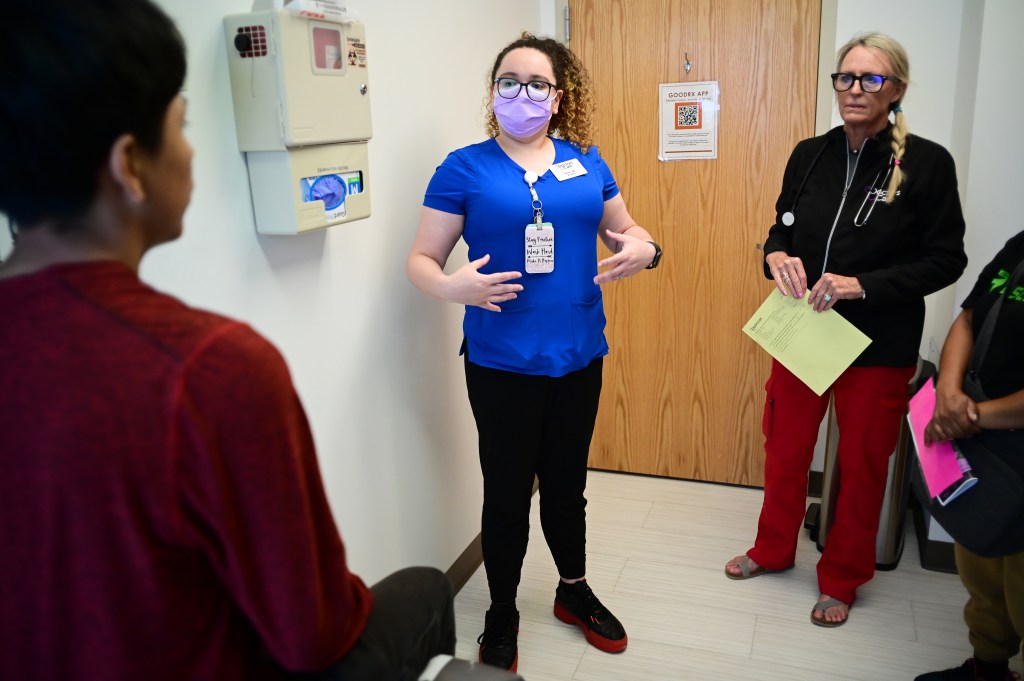Medical assistant student Helda McCauley, center, translates for certified physician assistant Sue Covington, right, to communicate with a patient at Doctors Care clinic in Littleton on Thursday, May 30, 2024. Doctors Care is a member of the Colorado Safety Net Collaborative. (Photo by Hyoung Chang/The Denver Post)
A recent Denver Post article by Meg Wingerter (Colorado clinics, mental health providers are seeing more uninsured patients — and they’re worried that’s the new normal,) did a good job of capturing the real challenges faced by our state’s “safety net” for the most vulnerable Coloradans.
We opted to speak out together on this critical issue because we represent a large swath of what people euphemistically call the safety net — community mental health centers across the state.
To respond to these needs, we call on the state leadership to use unspent federal pandemic funds to make sure providers can keep their doors open and continue to provide all the care our patients require.
To recap the problem: in recent months, many community mental health centers — the safety net clinics that care for individuals with the most serious mental illnesses — are seeing higher numbers of uninsured patients than they have in five years. More than 40 primary care safety net clinics across Colorado that don’t receive federal support have seen the number of uninsured patients increase between 10% and 25%. This is primarily due to the more than 500,000 Coloradans who have been removed from the Medicaid program due to the end of the federal health emergency related to the pandemic.
The Colorado Behavioral Healthcare Council and the Colorado Safety Net Collaborative are the organizations that provide mental health care to families and individuals who would not otherwise be able to afford it.
Unfortunately, in the days since the article appeared, the situation for Coloradans who live in poverty, have serious mental illness and/or substance use disorder, face chronic physical health conditions that, when left untreated, become emergency or life-threatening situations has only gotten worse.
To balance budgets, two of Colorado’s community mental health centers have announced layoffs, and others are on the brink. In an effort to preserve clinical positions and programs, one community mental health center let 13% of its administrative staff go and another, very small center laid off three of five executive positions.
Safety net clinics serving the uninsured simply have higher demand for their services with declining funding sources to cover the costs, even though paying for clinic care is exponentially less expensive than someone going to the emergency room. And if the clinic has declining Medicaid enrollment, that likely means the same result as the community health centers and other safety net providers that have had to let staff go.
Why are providers in this position? After all, they knew that, eventually, the Medicaid rolls would decrease once the federal government ended the public health emergency that ensured continuous coverage during and after the COVID pandemic. One reason is that state estimates of the decline in Medicaid enrollments were optimistic. Of course, forecasting is an art, not a science. But in some parts of the state the actual rate of disenrollment has been significantly greater than projected. The state has not been able to free up funds to cover the services for these newly uninsured.
But an equally important reason is the fundamental unaffordability of commercial health insurance. Every single person with commercial health insurance, whether they purchase it through their employer or on the Connect for Health Colorado exchange, continues to watch their out-of-pocket costs increase — whether premiums, deductibles, co-insurance or co-pays. This dynamic is not going to change. And more people who used to have private insurance will choose to “go bare.” The Federal Reserve regularly reviews the average sum it takes to push a family into crisis. For the Coloradans who need our safety net services, it’s about $400 in unanticipated expenses of any kind.
Bear in mind that people don’t stop needing or seeking care if they don’t have Medicaid or insurance. We have heard sobering stories from individuals who were in the hospital when they got notice that they no longer had Medicaid coverage. And providers are desperately trying to preserve critically important but underfunded programs.
There are existing pandemic federal funds that are unspent. Our state policy makers should immediately release those funds to shore up our challenged providers in the short term and then begin the long-term effort of reimagining how we fund our safety net.
These challenges impact us all, whether we personally use the safety net supports or not. Each one of us feels either the immediate, or downstream effects in increased health care costs, clogged emergency rooms, the economic challenges of a less healthy workforce and the increased public safety issues and diversion of public safety resources to manage people in mental and physical health care crisis.
In the end, the safety net covers us all either directly or indirectly. But it can’t do that when it’s only hanging on by a thread.
Kara Johnson-Hufford is the chief executive officer of the Colorado Behavioral Healthcare Council. Phyllis Albritton is a managing consultant with Colorado Safety Net Collaborative.
Sign up for Sound Off to get a weekly roundup of our columns, editorials and more.
To send a letter to the editor about this article, submit online or check out our guidelines for how to submit by email or mail.







